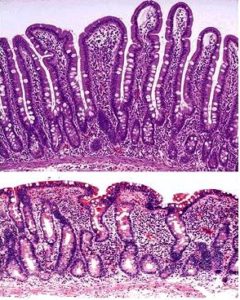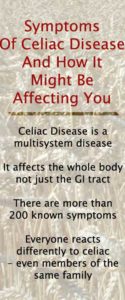
Symptoms Of Celiac Disease And How They May Be Affecting You
“Celiac disease can be difficult to diagnose because it affects people differently. There are more than 200 known celiac disease symptoms which may occur in the digestive system or other parts of the body. Some people develop celiac disease as a child, others as an adult. The reason for this is still unknown.”
This is from the Celiac Disease Foundation
I am not a doctor please do your own research and consult qualified medical professionals regarding your health.
Understanding Celiac Disease
Everyone is affected differently by this disease. Few people have the same experience. My experience is far different than that of my cousin who has celiac disease. In fact, my experience is very different than most people who have celiac disease! (To read my very long health story go here.)
Celiac affects the way you absorb vitamins and nutrients. Inside your intestines the surface is covered with villi: little hair-like parts. Celiac causes inflammation in the intestines which blunts the villi.
Villi

The top is what normal villi look like and the bottom are blunted
As tiny and thin as the villi are, they are super important in the process of absorption. They aide in the absorption of vitamins and minerals The villi are damaged when a person with active celiac (you can have the gene and it may not be active for your entire life) eats gluten. Damage done to the villi makes it so you can’t produce the enzymes to break down food the way your body needs it.
If you aren’t absorbing proper vitamins and nutrients that your body needs, it starts to have problems. The reason why everyone is different in their symptoms is because we are all different in what our bodies can and can’t absorb!
http://livehealthy.chron.com/importance-villi-small-intestine-digestion-nutrients-3923.html
The Villi’s Job
The job of the villi is to absorb the vitamins and nutrients putting those essential things our bodies need into our blood stream to be used. Inflammation in the intestine causes the villi to be blunted and unable to absorb vital vitamins and nutrients properly.
The first part of the small intestine is called the duodenum. It is in this first section that most of the fats, carbohydrates and proteins are absorbed.
My understanding of villi
Years ago, at a conference I went to, the speaker explained the villi this way: the extent to which the villi is damaged affects it’s ability to perform it’s job. The top part of the villi aids in absorption of lactose. The more damage to the villi, the more likely you are to be lactose intolerant with celiac disease. The next section of the villi aids to absorb sugars and the last section (bottom section by the mucosal lining of the intestines) aids in absorbing proteins.
Now, when we talk about parts of the villi we are talking about one little hair-like thread! The more villi that is damaged the less you are going to be able to absorb. The deeper, meaning the more blunted the villi, the less you will be able to absorb. So, we are talking about intestinal damage laterally throughout the intestines as well as how deep into the individual villis. (Not sure what the plural for villi is, perhaps villus?)
Same family, different experience
My cousin had the classic symptoms that children have. He frequently had diarrhea and constipation. Growing up, he frequently had stomachaches and gastro intestinal problems. When he was around 21 he developed a skin rash that was severe. In fact, the same problems on his skin were down his throat and affecting his stomach. He was hospitalized with many people thinking he wasn’t going to make it through this and that he had something that was terminal. When all was said and done, he was diagnosed with celiac disease. His rash was dermatitis herpetiformis also known as DH. He was the first in our family to be diagnosed.
Everyone was amazed at his improved health once he was gluten free.
My experience
Some people expect that family members will experience similar symptoms and have similar experiences, but that isn’t the case with celiac disease! I didn’t have a lot of gastrointestinal issues. I remember having “mystery” diarrhea. There seemed to be no reason for it and my mom would tell me to wash my hands better after using the bathroom. My doctor said it couldn’t be classified as diarrhea if it wasn’t all day, running to the bathroom. (I disagreed then and I disagree now!)
I thought I had more than normal gas and was told I just take after my grandpa who has a lot of gas. Oh yea! Just what every adolescent girl wants to hear!
My biggest and most troublesome symptom for way too many years was Urticaria! Urticaria is chronic hives. I wanted to tear my skin off! Who needs skin when it is going to cause you so much pain?! FYI, not a single hive since being diagnosed with celiac and going gluten free. It was an ordeal to finally getting the answers I needed. My Health Story.
Symptoms
 The quote at the top as well as the University of Chicago Celiac Disease Center says that there are more than 200 (known) symptoms for celiac! There may be more, but they haven’t been able to verify them. At conferences I have attended, I have had many professionals tell me hives aren’t a symptom for celiac, although I am living proof that hives are a symptom!
The quote at the top as well as the University of Chicago Celiac Disease Center says that there are more than 200 (known) symptoms for celiac! There may be more, but they haven’t been able to verify them. At conferences I have attended, I have had many professionals tell me hives aren’t a symptom for celiac, although I am living proof that hives are a symptom!
Celiac is a multisystem disease because it can affect every part of your body! It may begin with the inflammation in the gut, but because it affects absorption, it then affects every system of the body! When your body can’t get what it needs, it suffers.
Lets go from head to toe
- Hair loss
- Depression
- Anxiety
- Hyperactivity (can include ADD or ADHD symptoms)
- Fatigue
- Night blindness
- Headaches
- Sinus problems
- Mouth sores
- Enamel defects and tooth discoloring
- Bad breath
- Acid Reflux and heartburn
- Thyroid disorders/disease
- Heart Palpitations
- Heart Disease
- COPD (Chronic Obstructive Lung Disease)
- Bloating
- Liver disorders
- Anemia
- hyposplenism
- Diabetes
- Infertility
- Delayed puberty
- low bone density
- Joint pain
- Cancer
- Weight loss
- Foul Smelling Bowel Movements
- Gas
- Tingling numbness in legs
- Dermatitis Herpetiformis (DH)
- Hives
- Peripheral neuropathy-usually starts with numbness, tingling, or pain in fingers and toes can’t feel temperature or pain correctly and can affect muscle strength.
- In children: failure to thrive– low weight gain and growth
Associated diseases and problems
- Alopecia Areata (https://www.verywell.com/alopecia-areata-and-celiac-disease-563106)
- Cancer http://www.naturaleyecare.com/health-conditions/celiac-disease/
- Non-Alcoholic Fatty Liver Disease
- Heart Disease
- Thyroid Disease
- Addison’s Disease
- Liver diseases- including Auto-immune hepatitis
- Myasthenia Gravis
- Raynaud’s Phenomenon
- Scleroderma
- Sjogren’s Disease
- Lupus
Testing
See your doctor and request a celiac panel blood test be done to check for antibodies related to celiac disease:
- Anti-tissue transglutaminase (tTG)
- Anti-endomysium (EMA)
- Anti-deamidated gliadin peptides (DGP)
You may want to consider finding a gastroenterologist who is knowledgeable and up to date with his information on celiac disease. Beware of doctors who are using old data and may give you misinformation. After the blood work is done it is common to have a biopsy to access and confirm the diagnosis of celiac disease. The biopsy is the gold standard for diagnosis.
Always do your own research! You will probably know more about the current and accurate information than your doctor does.
I am not a doctor please do your own research and consult qualified medical professionals regarding your health.
Do I need a biopsy?
Not everyone diagnosed with celiac gets a biopsy and not everyone gets a blood test. (I went straight to the biopsy without any blood work. My cousin had blood work done and it came back negative, even though he had full blown DH! Everyone with DH has celiac disease!) If you have DH a biopsy of the skin may be done to diagnose celiac and to confirm that it is dermatitis herpetiformis.
However, a biopsy of the small intestine tells more about where you are, what is and has happened to you, gives an idea on how long it will take to recover, and gives you a more solid diagnosis.
Recovery
Again, everyone is different! I was discouraged when I didn’t bounce to incredible health in just a couple of months! I had read a lot and everything said how great I should be feeling after just 2 or 3 months of going gluten free, but I wasn’t!
- Give yourself time!-celiac didn’t wreak havoc on your body in a short time- it’s most likely been going on for longer than you have been aware of it.
- Evaluate your journey- are you being as careful as you should, are you missing anything, is there more you need to learn?
- Join a support group
- Educate yourself
- Find credible sources
- Follow gluten free/celiac bloggers who are knowledgeable
Diagnosis when you aren’t a classic case of celiac
So, how do people without the classic symptoms of diarrhea, constipation and other GI problems get diagnosed?
It can be hard to get a doctor to listen and take you seriously! I know! I have gone the rounds!
If a doctor isn’t listening to you, change doctors! Find one who will listen and take you seriously. If necessary, educate your doctor. The Gluten Intolerance Group has all kinds of printable, well written, well sourced information that can be printed out and given to your doctor.
If you suspect something is wrong with you, don’t give up the answer is out there! I was told many times to learn to live with my hives. I listened far too much to professionals who didn’t listen to me!
For years, I thought there was a connection to wheat, but I didn’t have enough information to get to the heart of the problem. The information available through the internet is so much better than it was 13, 20 or 25 years ago when I was struggling with all of my symptoms.
Sources
http://www.biology-online.org/articles/digestive_enzymes.html
https://www.verywell.com/small-intestine-1942443
http://www.newsmax.com/FastFeatures/what-does-small-intestine-do/2016/04/25/id/725675/
http://www.naturaleyecare.com/health-conditions/celiac-disease/





Recent Comments